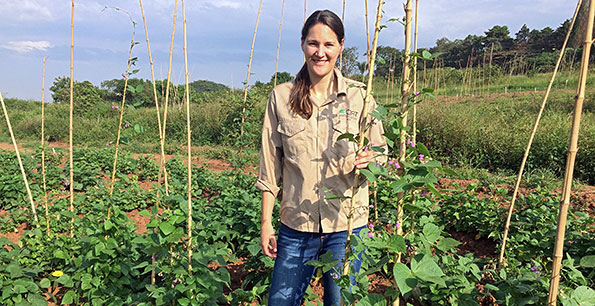Bean researchers are almost always cooped up in the laboratory and farm trials looking into various ways of improving production and productivity. They spend months and even years looking at solutions that will maximize bean yields to ensure food and nutrition security. Beans are a quick source of proteins and other essential micronutrients needed for nourishment and they take a shorter time to grow. Working towards addressing some of the challenges that inhibit maximized yield such as pests and diseases in bean production is therefore key and we work with various researchers from across the globe to address these challenges.
Dr. Michelle Nay of ETH Zürich is one such researcher we worked with during the research she was conducting. She recently won the Swiss Forum for International Agricultural Research (SFIAR) award for her project ‟Improving smallholder farmers’ food security through disease-resistant common beans”. Michelle has developed a toolbox that supports breeders in finding common bean varieties that are resistant to the devastating angular leaf spot disease. This is a significant achievement as the common bean is the most important grain legume for human consumption and a major protein source.
She conducted her study in Uganda in partnership with the Alliance of Bioversity International and CIAT (Alliance) through its bean programme – Pan Africa Bean Research Alliance (PABRA). The support has also been made possible by the support from Swiss Development Corporation (SDC)– one of the PABRA funding donors.
‘I investigated the effectiveness of resistance loci against diverse Angular Leaf Spot (ALS) pathogen strains from two continents. Based on the results, I developed a toolbox that facilitates the breeding for pathogen strain-specific resistance. The ALS breeding toolbox established in this research information about the resistance of the collection in glasshouse and field trials and molecular markers linked to resistance loci Taken together, this information will help breeders selecting and pyramiding the most effective resistance loci into their varieties’ she wrote on her paper.
She was mentored by Dr’s Bodo Raatz – Common bean Geneticist and Dr. Clare Mukankusi – Global Breeding Lead for Common Bean at the Alliance of Bioversity International and CIAT whom she worked with closely during her research in Uganda. ‘’Michelle was and continues to be an excellent scientist who blended so well with the bean research team of the Alliance in Uganda to conduct a study whose findings have paved new ways of tackling disease resistance breeding and disease pathotyping in common bean” says Dr. Clare.
The results from her research study helped PABRA secure funding to advance bean research from the Biotechnology and Biological Sciences Research Council (BBSRC) under the BeanEnhance project in partnership with National Crops Resources Research Institute (NACCRI), Tanzania Agricultural Research Institute (TARI), and NIAB-UK. Among the project’s objective is to understand the population structure of angular leaf spot in beans.
She will be presenting alongside another fellow awardee at the award ceremony in early December. The event will also put the research into a broader context. This year’s award-winning projects both contribute their part to the overarching goal of making nutritious food more available and accessible to all. In order to improve nutrition security, a broad range of research disciplines and approaches must be involved. At the event, the following questions will be discussed: What is the current state of nutrition security in developing countries? Which role agricultural research for development can play to support progress towards nutrition as the qualitative dimension of food security? The keynote speaker Lynnette Neufeld will look at the subject from the perspective of a foundation involved in the fight against malnutrition. Our concluding panel discussion provides an opportunity to debate these questions further.
The SFIAR offers an annual Award for graduates and scientists working in agricultural research for development.
Read Michelle’s full paper: Improving smallholder farmers’ food security through disease-resistant common beans

